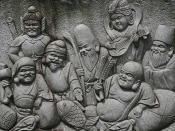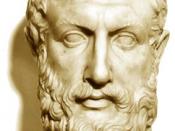Eternity, "ÃÂGod's Existence' & The Pre-Socratics The Milesians and the majority of Pre-Socratic philosophers* which followed, all described the world in terms of some stuff or combination of stuffs, which the world evolved from. For the majority of the Pre-Socratic philosophers, the world was not created, but was somehow born out of this stuff, guided by some eternal principle. Moreover, the Pre-Socratics believed that the world always existed and will go on forever. Thales believed that this underlying stuff was water. Heraclitus thought it was fire driven by "ÃÂLogos' (ie reason?). Pythagoras thought the world could be explained by the form of quantity (i.e. numbers). Anaximenes thought that it was air; Anaximander thought it was "aperion"ÃÂ. It seems easy to come to Thales defense, considering the amount of water in the world; this would be a more likely hypothesis than the fire of Heraclitus or the recipes of elements, which Anaxagorus claimed.
Answering the question: Has the world always existed ?(and will never end), requires that we separate the philosopher Promenades and Pythagoras from the other pre-Socratics because Parmenides and Pythagoras both give philosophies which explain why we should believe the world has always existed, whereas the other pre-Socratics do not provide any specific reason or argumentation, they only posit that the world is made of such and such elements guided by some principle. Parmenides reasons that the world does not change, that change is an illusion since being extends indefinitely. Parmenides claims that being is "ÃÂOne' and infinite. He calls the oneness of the world divine to refer to its everlastingness rather than some deity, so it may take some qualification before Parmenides is labeled a pantheist. Pythagoras reasons that everything which exists can be explained in terms of numbers, since numbers appear to transcend time, this is probably why he believed the world (i.e. quantity) always existed.
In the final analysis, it seems that the answer to the question: Why did the Pre- Socratics think the world always existed? (and never end), cannot be found in any of their writing explicitly. The answer comes from what appears to be the common-sense idea that you cannot get something from nothing, and so there must have always been"æ something. The "ÃÂfragments' that are left from the Pre-Socratics and any mention of them from later philosophers do not give any particular explanation The Pre-Socratics assert that there has always been this stuff which existed, and from this stuff the world evolved, guided by some eternal principle. I assume that if these Pre-Socratics say that there has always been this stuff which existed, then the guiding principle (e.g. "Logos"ÃÂ, "Love & Strife"ÃÂ, "apeiron"ÃÂ, "the One"àof Parmenides, "Nous"ÃÂ), must have also always co-existed eternally, since why would these respective "ÃÂeternal principles' come into being at some arbitrary point in time? If these Pre-Socratic philosophers claim that there has always been this stuff, yet this "stuff"àitself is not the world, but the world is an entity that has evolved from this stuff as the result of a governing principle (Logos, Nous) than they would be in effect saying that the world did have a beginning. It seems it may be relative in regards to how one wants to define the world. Where do we draw the line to define "ÃÂthe world' in its process of development? Is "ÃÂthe world' the eternal elements that the pre-Socratics talk about or the result of a governing principle affecting these eternal elements? For example, Anaximander speaks of the "eternal of hot and cold was separated off at the coming to be of this world"à(fragment [4]). Or when Anaximander says: "Apeiron nature, from which come into being the heavens and the worlds in them"ÃÂ(fragment [3]).
I strongly agree with this idea, that you cannot get something from nothing. It should be stressed though, that if we just start from the idea that "ÃÂyou cant get something from nothing', this only defends the idea that something has always existed, not necessarily the world as we know it, a traditional God, or even the beginning stages of the world which these Pre-Socratics describe. It may be that the world has not always existed, but according to this premise, which I hold it must be that, there always has been"æ something. Most theists will want to say that this something or "ÃÂuncaused cause' is what is referred to as "ÃÂGod'. If I am a Christian and necessarily endorse the idea of God creating ex nihilo ("ÃÂout of nothing'), have I then contradicted myself? Aristotle said everything has a material cause, so the question could be framed as: "What is the material cause of the world?"ÃÂ. Well I guess I would have to make another distinction to avoid contradicting myself. I will borrow a premise from Christian theology and submit that it applies to all monotheistic, "ÃÂcreation-minded' religions. The premise is that God is being itself, and so when He/It creates, He creates from His being. Christian theology itself has proposed this metaphysical idea by interpreting the Old Testament passage "I am who am."à(Genesis 2:16) We don't want to say that God created the world from Himself (i.e. His stuff/nature), since that would lean us towards pantheism. Or I could simply excuse God (since He is supposed as All Powerful) from the metaphysical laws, which our minds appear to be bound by. There also seems to be no problem with asserting that not only God has always existed, but some primal stuff from which God made the world. Is there a problem with saying that "Water or x is eternal?"àHowever, we cannot discard the idea of "ÃÂGod' since matter alone is unable to account for the design in the world which implies intelligence. If I'm a non-materilalist, then for me intelligence comes from something immaterial and so some kind of mind must have played a part in the creation of the world (ie "ÃÂGod'). Perhaps we also need God to account for any motion in the world, although some may exclaim "What's wrong with saying that the world has always been in motion to some extent?"àThe Design Argument and the Efficient Cause direction of thought, together with my "religious experience"àpresent themselves to me so favorably that its unlikely I will give up my belief in God. This belief is as analogous in terms of evidence as my belief that there is evidence that e.g.: "Matter is made of atoms"ÃÂ. Of course it is more intellectually fashionable to be a non-believer, as opposed to holding onto a belief which the non-believer considers to be the result of brainwashing (i.e. conditioning) or some other unconscious intention.
For someone to claim that God has always existed, also still does not answer the question as to whether the universe had a beginning, as mentioned earlier, "ÃÂGod' is not the "ÃÂuniverse'. There are arguments to demonstrate that time had a beginning, but the subject of time is a controversial subject in philosophy and time does not entail the existence of any material or immaterial beings (i.e. "ÃÂthe world'). We could show that the world always existed, if we claim that the world is God and qualify God according to the traditional attribute: That God (the gods) are eternal. The concept of divinity at the time was a monotheism with a God who was present in the world as a guiding principle, but not technically the world itself.
It seems that saying that the world always existed (and will never end) in no way threatens theism. Even if the world had no beginning (or end) it seems there are many plausible forms of theism, which a believer could endorse. Perhaps the world has always existed and God did not create it, but eternally stands apart from it (a kind of deism?). In fact the pre-Socratics universal and eternal principles (Logos, Love and hate) could be qualified as like impersonal gods, though the Pre Socratics did not view them as anything spiritual or transcendent, but rather as forces in the world, which even a god would be subjected to. If these pre-Socratic philosophers (like Thales, Anaximenes) mention "ÃÂgods' in their fragmentary writings and they hold that the world had no beginning, than they themselves must think there is no problem with theism and saying the world is eternal. When the pre-Socratics say that the world is eternal, they are (in a way) supporting what is considered to be a strong direction of thought for God's existence. The idea that you can't get something from nothing, entails that there must have always been something. Even though this Aristotelian metaphysical law does not necessitate the traditional concept of "ÃÂGod', the fact that the idea of "ÃÂGod' is compatible with the class: "that which always existed"àis an important intellectual ally for the theists' belief. There is further demonstration to be done, to attribute to the Creator"æHis/Its divine attributes.
In the final analysis, it seems that the question of whether the world has always existed can be answered by either science or religion. Scientists claim that there was a process by which the universe began (including a "ÃÂbeginning') yet this requires one to have a certain level of faith in science itself. The Pre-socratics probably would have claimed that the world had a beginning (religious or secular) if they had the scientific knowledge we have now. Of course, the theist will believe in creationism, although in light of science, it seems the theist is forced to embrace a revised creationism.





